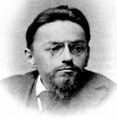April 9: Difference between revisions
No edit summary |
No edit summary |
||
| Line 2: | Line 2: | ||
{{Are_You_Sure/April 9}} | {{Are_You_Sure/April 9}} | ||
<br style="clear:both"> | <br style="clear:both"> | ||
[[File:Are You Sure (9 April 2021).png|thumb|left|Screenshot: Are You Sure (April 9, 2021)]] | [[File:Are You Sure (9 April 2021).png|thumb|left|Screenshot: Are You Sure (April 9, 2021)]] | ||
Revision as of 14:14, 8 April 2021
Are You Sure ... (April 9)
• ... that physicist and academic Thomas Johann Seebeck (9 April 1770 – 10 December 1831) discovered the thermoelectric effect, where a junction of dissimilar metals produces an electric current when exposed to a temperature gradient?
• ... that mathematician and electrical engineer Charles Proteus Steinmetz (9 April 1865 – 26 October 1923) promoted the development of alternating current, formulating mathematical theories which will advanced the expansion of the electric power industry in the United States?
• ... that Édouard-Léon Scott de Martinville (25 April 1817 – 26 April 1879) made the oldest known recording of an audible human voice, a visual recording of audio data; that de Martinville managed to sell several phonautographs to scientific laboratories for use in the investigation of sound, proving useful in the study of vowel sounds; that the phonautographs initiated further research into tools able to image sound, such as Koenig's manometric flame?
On This Day in History and Fiction
1770: Physicist and academic Thomas Johann Seebeck born. Seebeck will discover the thermoelectric effect.
1860: On his phonautograph machine, Édouard-Léon Scott de Martinville makes the oldest known recording of an audible human voice. A visual recording of audio data, it will first be played back in 2008.
1865: Mathematician and electrical engineer Charles Proteus Steinmetz born. Steinmetz will foster the development of alternating current, formulating mathematical theories which will advance the expansion of the electric power industry in the United States.
1978: Musician and alleged math criminal Skip Digits performs at the Kennedy Center for the Arts.




